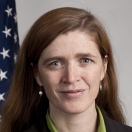
Ed. Note: Last week, we celebrated Sunshine Week here in America. It goes without saying that technology has fundamentally impacted how government works around the world. Samantha Power, Senior Director and Special Assistant for Multilateral Affairs and Human Rights, highlights similar good government efforts underway in countries around the world.
While “Sunshine Week” may be an American invention, the momentum for greater transparency and accountability in government is a global phenomenon. In countries around the world, governments and civil society groups are taking new and creative steps to ensure that government delivers for citizens and to strengthen democratic accountability.
President Obama witnessed this extraordinary innovation first-hand during his trip to India in November. He attended the first-ever “Expo on Democracy and Open Government” and sampled the ways in which technology was being used by Indian citizens and civil society groups to expose corruption. One group showed him the way Indians could use a simple SMS code to obtain background knowledge on political candidates – their financial assets, any criminal backgrounds, etc. He also saw a ground-breaking website, www.ipaidabribe.com, where Indians posted their tales of having been forced to pay a bribe, in refusing to pay a bribe, and in “not having to pay a bribe” – stories celebrating Indian public servants’ refusal to succumb to corruption.
During his speech to Parliament, he celebrated the passage of India’s Right to Information Act (RTA) and, in his interactions with civil society groups, saw how ordinary Indians are using the RTA to improve the delivery of basic services, root out corruption in government programs, andempower voters to be more informed participants in democratic politics. These innovations in democratic governance are cropping up on every continent:
- El Salvador and Liberia recently passed progressive freedom of information laws, joining more than 80 countries with legislation in place, up from only 13 in 1990;
- A few weeks ago in Paris, six new countries from Europe, Africa, Central Asia, and the Middle East met the high standards of the Extractive Industries Transparency Initiative (EITI), empowering citizens with unprecedented information about payments made for the extraction of naturalresources;
- Brazil and South Africa are pioneering innovative tools to promote budget transparency and foster citizen engagement in budget decision-making, along with tens of other countries that are making budget proposals and processes open to public input and scrutiny;
- Civil society groups are developing mechanisms to enable citizens to keep track of what happens in legislatures and parliaments, including impressive web portals such as votainteligente.cl in Chile and mzalendo.com in Kenya; and
- Experiments in citizen engagement in Tanzania, Indonesia, and the Philippines, are demonstrating that citizen efforts to monitor the disbursement of government funds for education, health, and other basic services, actually decrease the likelihood of corruption and drive better performance in service delivery.
In his address in September before the UN General Assembly, President Obama hailed open society and open government, and called on countries to bring to the United Nations this September their specificcommitments to promote transparency, empower citizens, fight corruption, and leverage new technologies. In Brazil, he will welcome the joint leadership of the U.S. and Brazil in a global open government initiative that assembles countries from all over the world – and at different stages of economic and democratic development -- to share their best practices. As we push for greater openness a home, and offer our support to reformers and activists in other countries, it is clear that all of us can learn a tremendous amount from innovators that are pushing the frontiers of transparency and accountability around the globe.
Samantha Power is Senior Director and Special Assistant for Multilateral Affairs and Human Rights


